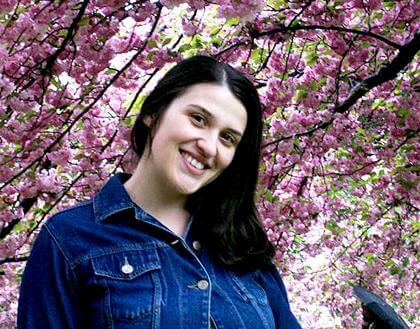By Anna Gustafson
Forest Hills resident Azra Smailkadic-Brkic was a teenager when her home country, now Bosnia and Herzegovina, became embroiled in a genocide and war that killed about 100,000 people, many of them Muslim.
The now 30-year-old had been able to escape her home and stay in neighboring Croatia with her sister during the 3-1/2-year war, which included the Srebrenica genocide in 1995 when the Bosnian Serb army systematically murdered more than 7,000 men and boys over the course of five days. Though Smailkadic-Brkic was able to avoid the violence that had consumed her homeland, her parents remained in Bosnia and she did not see them for more than three years.
It has been an experience that has inevitably shaped her life — she lost her 37-year-old uncle whose wife gave birth the day of his funeral, has gone on to get her master’s in human rights at the University of Sarajevo, and is now married to a man she said will likely never be able to return to his home in Bosnia and Herzegovina’s Republic of Srpska, a part of the country in which the Serbs committed ethnic cleansing.
“The people there, they were your neighbors,” said Smailkadic-Brkic, who is Bosniak — otherwise known as a Bosnian Muslim. “You drank coffee with them, attended birthday parties with them and suddenly the next day they turn against you. How can you go back and believe they are nice people?”
As someone who intimately knows the horror genocide and war can wreak on a country — the lives it takes even from those who do not die, the deep political and social chasms that remain more than a decade later — Smailkadic-Brkic was an exceptional candidate for the anti-genocide fellowship she received earlier this month, according to a spokeswoman for the Genocide Intervention Network.
The group, based in Washington, D.C., named 18 individuals from throughout the country as Carl Wilkens Fellows. The fellows, including Smailkadic-Brkic, will receive advocacy training, access to experts and an organizing grant in order to “end and prevent genocide,” said Mame Annan-Brown, director of marketing and communications at the Genocide Intervention Network.
Annan-Brown said fellows will use their experience and knowledge to create awareness about current genocides in the Sudan and the Congo that have killed more than 300,000 and 5 million, respectively.
The fellowship is named for Carl Wilkens, the only American to remain in Rwanda through the entirety of the Rwandan genocide in 1994 in an attempt to help the people. Ultimately, more than 800,000 people would die in the Rwandan genocide.
The fellowship will give resources to Smailkadic-Brkic, who moved to Forest Hills two years ago, to do something she has done for a long time: advocate against and inform people about genocide. While getting her master’s at the University of Sarajevo, she was the program coordinator for a course entitled “War Crimes, Genocide and Memories,” the first of its kind in southeast Europe.
She is now planning to begin her informational campaign at her book club in Forest Hills. Smailkadic-Brkic will ask members to read and discuss “Diary: A Child’s Life in Wartime Sarajevo.”
“The aim of this fellowship is to let others know what’s going on around the world,” she said. “It’s unacceptable to kill somebody only because they’re from another religion, race or ethnicity. It’s a comfort for genocide survivors to let the world know what’s going on.”
Reach reporter Anna Gustafson by e-mail at agustafson@cnglocal.com or by phone at 718-260-4574.


































